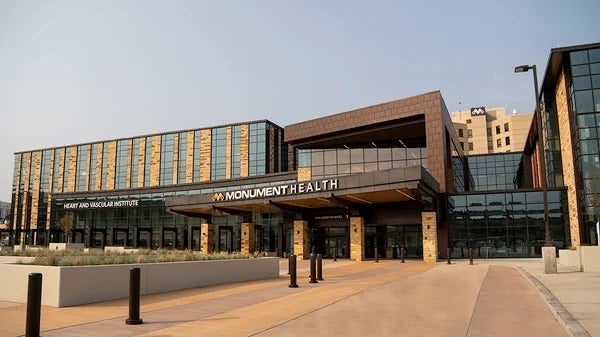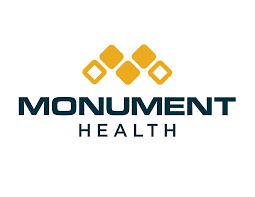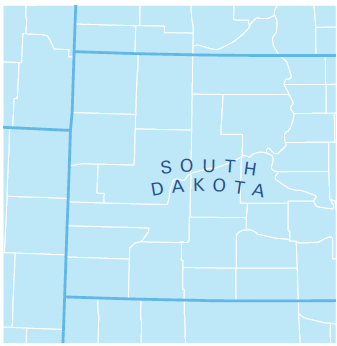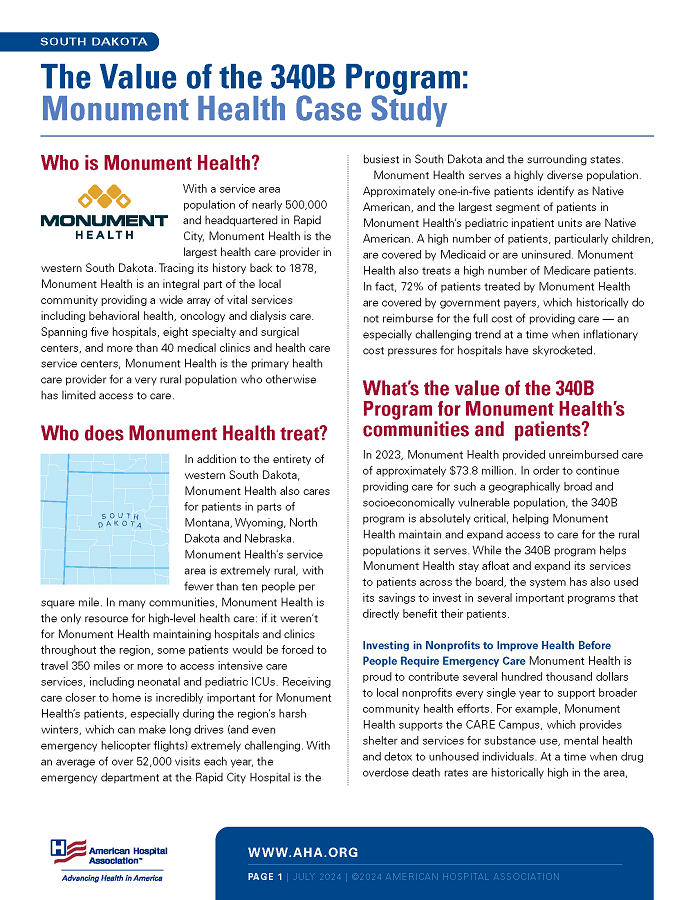

Monument Health | South Dakota
The Value of the 340B Program Case Study
Who is Monument Health?

 With a service area population of nearly 500,000 and headquartered in Rapid City, Monument Health is the largest health care provider in western South Dakota. Tracing its history back to 1878, Monument Health is an integral part of the local community providing a wide array of vital services including behavioral health, oncology and dialysis care. Spanning five hospitals, eight specialty and surgical centers, and more than 40 medical clinics and health care service centers, Monument Health is the primary health care provider for a very rural population who otherwise has limited access to care.
With a service area population of nearly 500,000 and headquartered in Rapid City, Monument Health is the largest health care provider in western South Dakota. Tracing its history back to 1878, Monument Health is an integral part of the local community providing a wide array of vital services including behavioral health, oncology and dialysis care. Spanning five hospitals, eight specialty and surgical centers, and more than 40 medical clinics and health care service centers, Monument Health is the primary health care provider for a very rural population who otherwise has limited access to care.
Who does Monument Health treat?
 In addition to the entirety of western South Dakota, Monument Health also cares for patients in parts of Montana, Wyoming, North Dakota and Nebraska. Monument Health’s service area is extremely rural, with fewer than ten people per square mile. In many communities, Monument Health is the only resource for high-level health care: if it weren’t for Monument Health maintaining hospitals and clinics throughout the region, some patients would be forced to travel 350 miles or more to access intensive care services, including neonatal and pediatric ICUs. Receiving care closer to home is incredibly important for Monument Health’s patients, especially during the region’s harsh winters, which can make long drives (and even emergency helicopter flights) extremely challenging. With an average of over 52,000 visits each year, the emergency department at the Rapid City Hospital is the busiest in South Dakota and the surrounding states.
In addition to the entirety of western South Dakota, Monument Health also cares for patients in parts of Montana, Wyoming, North Dakota and Nebraska. Monument Health’s service area is extremely rural, with fewer than ten people per square mile. In many communities, Monument Health is the only resource for high-level health care: if it weren’t for Monument Health maintaining hospitals and clinics throughout the region, some patients would be forced to travel 350 miles or more to access intensive care services, including neonatal and pediatric ICUs. Receiving care closer to home is incredibly important for Monument Health’s patients, especially during the region’s harsh winters, which can make long drives (and even emergency helicopter flights) extremely challenging. With an average of over 52,000 visits each year, the emergency department at the Rapid City Hospital is the busiest in South Dakota and the surrounding states.
Monument Health serves a highly diverse population. Approximately one-in-five patients identify as Native American, and the largest segment of patients in Monument Health’s pediatric inpatient units are Native American. A high number of patients, particularly children, are covered by Medicaid or are uninsured. Monument Health also treats a high number of Medicare patients. In fact, 72% of patients treated by Monument Health are covered by government payers, which historically do not reimburse for the full cost of providing care — an especially challenging trend at a time when inflationary cost pressures for hospitals have skyrocketed.
What’s the value of the 340B Program for Monument Health’s communities and patients?
In 2023, Monument Health provided unreimbursed care of approximately $73.8 million. In order to continue providing care for such a geographically broad and socioeconomically vulnerable population, the 340B program is absolutely critical, helping Monument Health maintain and expand access to care for the rural populations it serves. While the 340B program helps Monument Health stay afloat and expand its services to patients across the board, the system has also used its savings to invest in several important programs that directly benefit their patients.
Investing in Nonprofits to Improve Health Before People Require Emergency Care
Monument Health is proud to contribute several hundred thousand dollars to local nonprofits every single year to support broader community health efforts. For example, Monument Health supports the CARE Campus, which provides shelter and services for substance use, mental health and detox to unhoused individuals. At a time when drug overdose death rates are historically high in the area, this initiative saves lives, helps patients manage their substance use disorders, improves health outcomes in the community, and lowers the risk of patients requiring emergency services — a win-win for patients and the community. Improving patients’ health with preventive community initiatives is one way that Monument Health is utilizing its 340B savings to address community health needs.

Expanding Access to Pharmacy Services in Communities Big and Small
In addition to providing discharge medications to patients regardless of their ability to pay, Monument Health also partners with most pharmacies in western South Dakota to ensure patients receive their medications in a timely manner and at a convenient location in their community. Over the past few years, many pharmacies in the state have closed, so being able to contract with Monument Health helps remaining pharmacies keep their doors open to patients who otherwise lack options within an hour’s drive.
In addition to its network of contract pharmacies, Monument Health also maintains retail pharmacies at certain hospitals and clinics and maintains a specialty pharmacy in Rapid City, which is particularly important for their cancer patients. Whether it's in South Dakota’s largest cities or small towns, the 340B program helps Monument Health provide pharmaceutical services in the convenience of their local community, improving medication adherence and overall patient health outcomes.
340B Hospitals Need Support
For Monument Health, the 340B program provides critical support to everything the system does for patients, from emergency care and specialty services to nonprofit investments and pharmacy access. Ultimately, the program is working as federal lawmakers intended: it is helping Monument Health stretch its resources, increase the number and mix of services, enhance access, and improve health care outcomes for the region’s most vulnerable patients and communities.
Unfortunately, some are trying to undermine the 340B program, including pharmaceutical companies placing unreasonable and unlawful demands on 340B hospitals, as well as regulatory and legal threats to this vital program from adversaries. If the 340B program were to be curtailed, thousands of South Dakotans would be at risk of losing access to care in their communities. Without 340B savings, Monument Health’s ability to maintain and expand access to services like pediatrics, cancer care and behavioral health would be threatened, services that are otherwise inaccessible for the communities they serve. 340B hospitals like Monument Health and the patients and communities they care for need the federal government to continue to protect the 340B Drug Pricing Program and the critical resources it affords to South Dakotans and Americans across the country.


